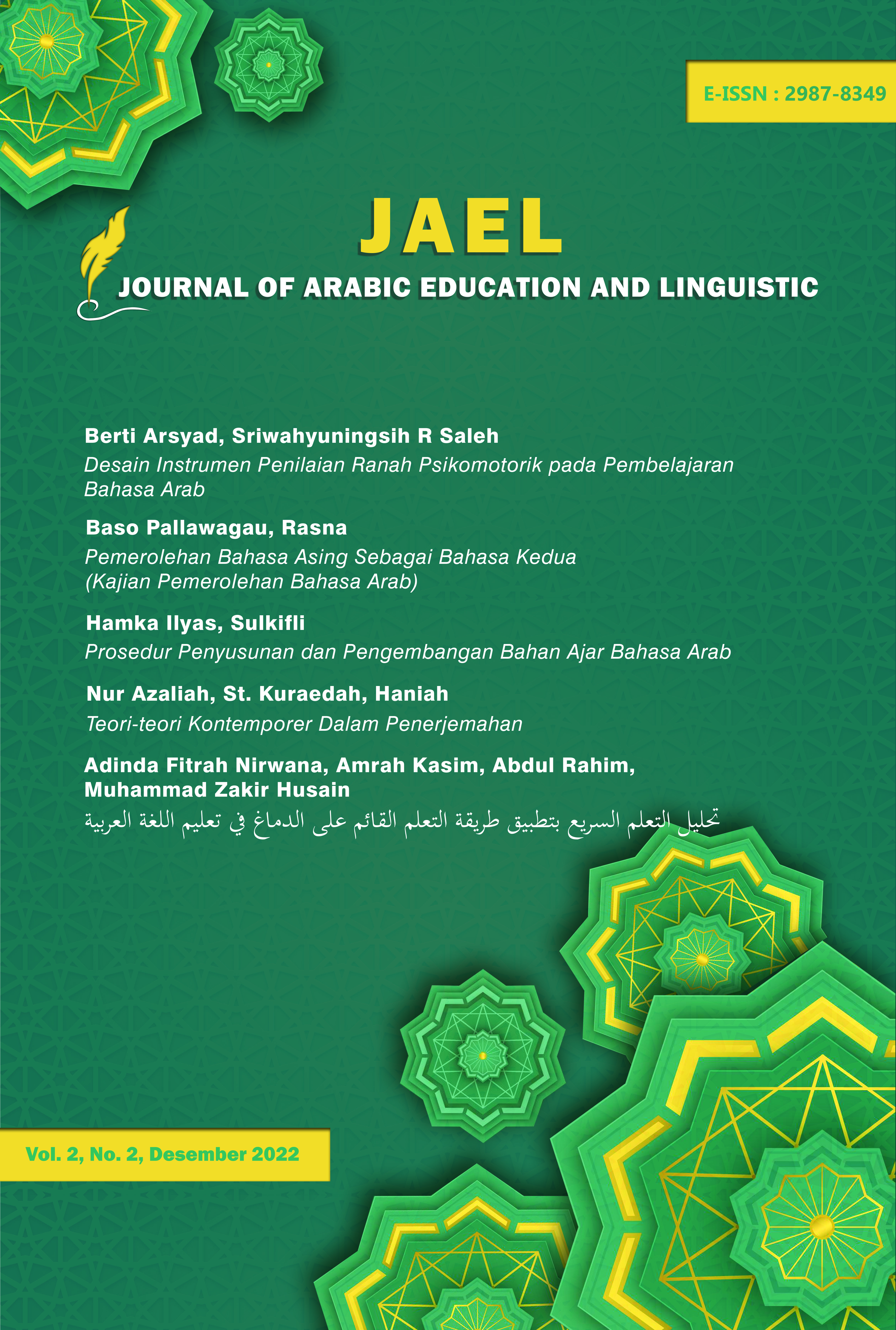Design of Psychomotor Area Assessment Instruments in Arabic Learning
Abstract
Characteristics of psychomotor skills in the form of sensory skills, alertness, and the ability to act in a complex manner. Psychomotor skills of students in learning Arabic can be seen in the skills of students in carrying out language expressions. This study aims to describe how to design and design assessments in the psychomotor domain in learning Arabic. The method used in this research is descriptive qualitative with the type of research (library research), based on the method and type of research, the data sources are books and scientific articles that intersect with the subject matter. The results showed that the design and design of the psychomotor domain assessment instrument in Arabic learning could be done in the form of tests and non-tests. Test assessment instruments can be carried out when the learning process has taken place, and non-test instruments can be carried out during the process, namely when students practice.
References
Akbar, M Army, H M Mulhim, Universitas Lambung Mangkurat, and Guru Profesional, ‘Intrumen Penilaian Harian Aspek Psikomotor Pendidikan Jasmani Olahraga Dan Kesehatan’, Stabilitas: Jurnal Pendidikan Jasmani Dan Olahraga, 1.1 (2020), 56–62
Dudung, Agus, Penilaian Psikomotor, KARIMA, Cetakan I, (Depok: KARIMA, 2018)
Eliza, Fivia, Suriyadi Suriyadi, and Doni Tri Putra Yanto, ‘Peningkatan Kompetensi Psikomotor Siswa Melalui Model Pembelajaran Project Based Learning (PjBL) di SMKN 5 Padang’, INVOTEK: Jurnal Inovasi Vokasional Dan Teknologi, 19.2 (2019), 57–66 <https://doi.org/10.24036/invotek.v19i2.427>
Miranti, Kiki, Ahmad Rusyadi, and Fahmi Fahmi, ‘Melatih Keterampilan Psikomotorik Siswa Melalui Penggunaan Lembar Kerja Siswa (LKS)’, Journal of Banua Science Education, 2.2 (2022), 93–98 <https://doi.org/10.20527/jbse.v2i2.106>
Munip, Abdul, Penilaian Pembelajaran Bahasa Arab (Yogyakarta: Fakultas Ilmu Tarbiyah dan Keguruan, 2017) <http://tarbiyah.uin-suka.ac.id/>
Nurwati, Andi, ‘Penilaian Ranah Psikomotorik Siswa Dalam Pelajaran Bahasa’, Edukasia : Jurnal Penelitian Pendidikan Islam, 9.2 (2014), 385–400 <https://doi.org/10.21043/edukasia.v9i2.781>
Pasaribu, Alanisa Lola, ‘Pengembangan Instrumen Penilaian Ranah Psikomotor Pada Materi Titrasi Asam Basa Kelas Xi-Mia Sman 4 Kota Jambi’, Program Studi Pendidikan Kimia Jurusan dan Ilmu Pengetahuan Alam FKIP Universitas Jambi (Universitas Jambi, 2017)
Suarbawa, I Putu, ‘Penerapan Model Problem Based Learning (Pbl) Pada Mata Pembelajaran Corel Draw Untuk Meningkatkan Hasil Belajar Di Ranah Psikomotor’, Indonesian Journal Of Educational Research and Review, 2.2 (2019), 162 <https://doi.org/10.23887/ijerr.v2i2.17624>
Sugiarti, ‘Penilaian Psikomotor Siswa Pada Pembelajaran Fisika Melalui Model Pembelajaran Guided Inquiry’, Journal of Physics and Science Learning, 02.1 (2018), 78–84


 This work is licensed under
This work is licensed under